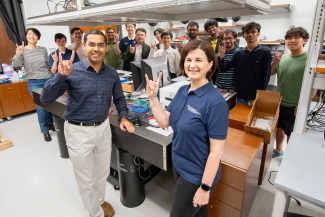
Photo: Prof. Jaydeep Kulkarni, center left, and department chair Diana Marculescu, center right, along with the first cohort of students from the ASIC Design course.
With the rapid proliferation of semiconductor technology in various application domains, there is an increased demand for custom integrated circuits to achieve the best power performance metrics. Thus, there is a critical need to develop a workforce skilled in integrated circuit design, having broad exposure to the entire ASIC (Application Specific Integrated Circuits, also called chips) design cycle.
Last Fall, in a collaborative effort led by department chair Diana Marculescu, associate professor Jaydeep Kulkarni, and with the support of industry partners including Apple, Cadence, NXP, and Silicon Labs, Texas ECE launched a course on ASIC Design targeted towards next generation semiconductor workforce development in integrated circuit designs.
The first cohort of students recently completed this dual semester course.
This initiative aligns with the critical mission outlined in the Texas State CHIPS Act and the Texas Institute of Electronics, underscoring its relevance and importance.
Prof. Kulkarni developed and taught this new two-semester graduate course, “ASIC Design Lab I and II,” covering the entire design, fabrication, and silicon measurement cycle of integrated circuits.
U.S. semiconductor companies are expected to add approximately 31,000 new masters-level jobs by 2030, according to a July 2023 report from the Semiconductor Industry Association and Oxford Economics. Nearly 40% of those jobs risk going unfilled due to a lack of qualified candidates.
The ASIC Design Lab-I course allowed them to collaborate in teams on novel circuit technologies and devise ASIC designs to validate their research ideas. By the end of the first semester, they submitted four designs to a semiconductor foundry for manufacturing.
In the second semester, students continued working in the ASIC Design Lab-II course by designing the PCB, test board setup, and developing microcontroller/FPGA infrastructure for data acquisition. This enabled students to acquire a post-silicon debugging and measurement skillset.
"This practical approach to learning, a cornerstone of this course, empowered students to acquire skillsets both in the pre-silicon and the post-silicon phases using commercial silicon process technology," said Kulkarni.
Starting in the fall of 2025, UT will offer a new Master of Science in Engineering with a major in semiconductor science and engineering. The program, a collaboration between the Cockrell School of Engineering and College of Natural Sciences, will give students a deep understanding of the science of semiconductors and how to engineer and manufacture these devices. This will be the first program in the state, and one of a select few nationwide, to develop a workforce of master’s students to bolster a semiconductor industry hungry for talent. Texas ECE's newly offered ASIC Design Lab course will contribute towards accomplishing the goals of this new master's program in Semiconductor Science and Engineering.
